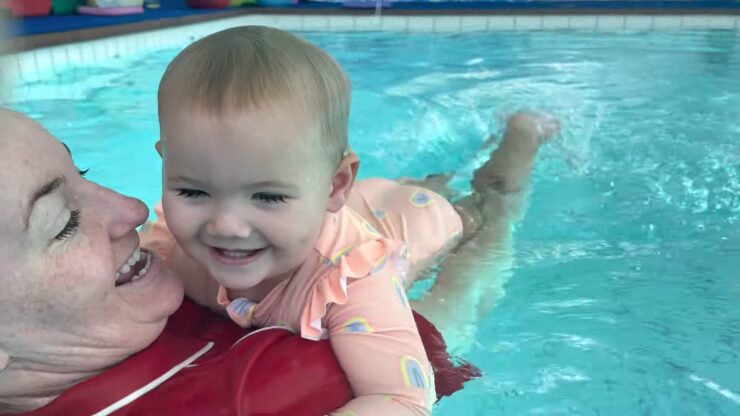The idea of teaching infants to swim may seem surprising to some, but the benefits of infant swimming lessons extend far beyond the pool. Early exposure to aquatic environments not only promotes water safety but also contributes significantly to the physical, cognitive, and emotional development of young children.
In this article, we explore the numerous advantages that come with introducing infants to the wonders of swimming. Infant swimming lessons have gained popularity in recent years as parents recognize the numerous benefits of introducing their little ones to water at an early age.
Contrary to the traditional belief that swimming lessons are reserved for older children, experts now advocate for starting water familiarization as early as infancy. In this article, we will explore the advantages of infant swimming lessons, emphasizing the positive impact they can have on a child’s development, safety, and overall well-being.
1. Water Safety and Confidence
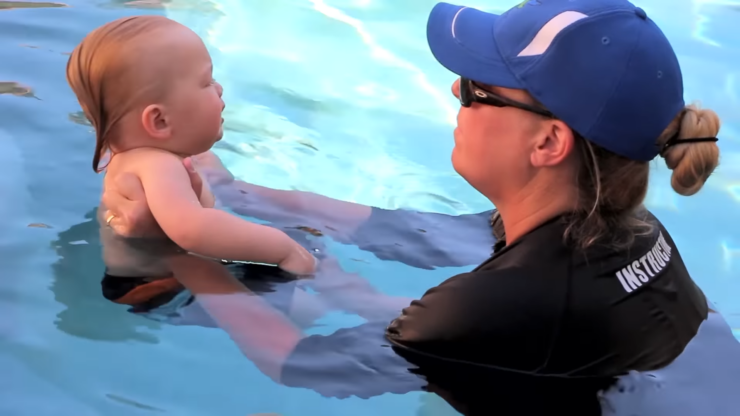
One of the primary benefits of infant swimming lessons is the development of essential water safety skills. Teaching babies to float on their backs, kick, and grasp the edge of the pool provides them with the basic tools to navigate the water safely.
This early exposure instills confidence in the water, reducing the risk of fear or anxiety around aquatic environments later in life. One of the most compelling reasons for infant swimming lessons is the emphasis on water safety.
Drowning is a leading cause of accidental death in children, and introducing infants to swimming lessons early on can be a crucial step in preventing water-related accidents. These lessons teach infants important water survival skills, such as floating on their backs, turning in the water, and reaching the edge of the pool. While no program can make a child “drown-proof,” early exposure to swimming lessons significantly reduces the risk of drowning incidents.
2. Physical Development
Infant swimming lessons contribute to the overall physical development of a child. The resistance provided by water enhances muscle strength and coordination, promoting motor skill development. Floating, kicking, and reaching for objects in the water engage various muscle groups, fostering a foundation for both gross and fine motor skills.
The physical and cognitive benefits of infant swimming lessons are remarkable. Water activities engage a baby’s muscles and motor skills, promoting strength and coordination. Floating, kicking, and reaching for objects in the water stimulate both gross and fine motor skills.
Moreover, the water environment enhances sensory experiences, contributing to cognitive development. Studies suggest that babies who participate in regular swimming lessons may reach developmental milestones earlier than their non-swimming peers.
3. Cognitive Benefits
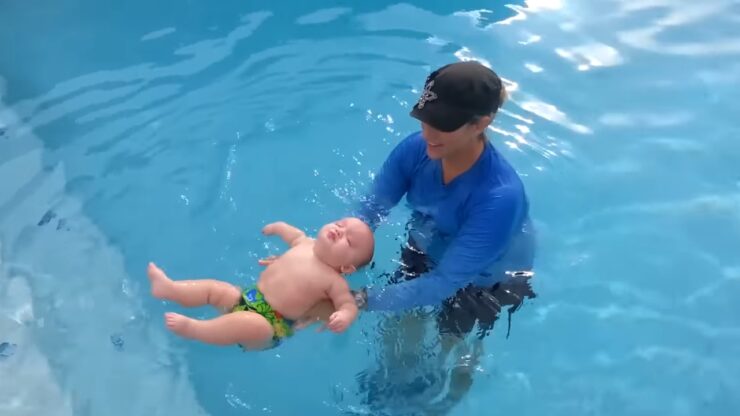
Engaging in swimming lessons from an early age has been linked to cognitive benefits for infants. The multisensory experience of being in the water stimulates the development of the brain, enhancing sensory perception and spatial awareness. Activities such as following simple instructions, recognizing objects, and responding to cues during swimming lessons contribute to cognitive growth.
4. Bonding and Socialization
Participating in infant swimming lessons provides a unique opportunity for parents and caregivers to bond with their little ones. The shared experience of being in the water fosters a strong emotional connection between the child and their primary caregivers.
Additionally, group swimming lessons offer infants the chance to socialize with their peers, promoting early social development and enhancing communication skills. Infant swimming lessons provide a unique opportunity for parents to bond with their babies in a relaxed and enjoyable setting.
The shared experience of being in the water fosters a strong emotional connection between parent and child. Many swimming programs encourage parent participation, allowing parents to actively engage in the learning process and build trust with their infants. This bonding experience not only strengthens the parent-child relationship but also creates positive associations with water.
5. Early Water Adaptation
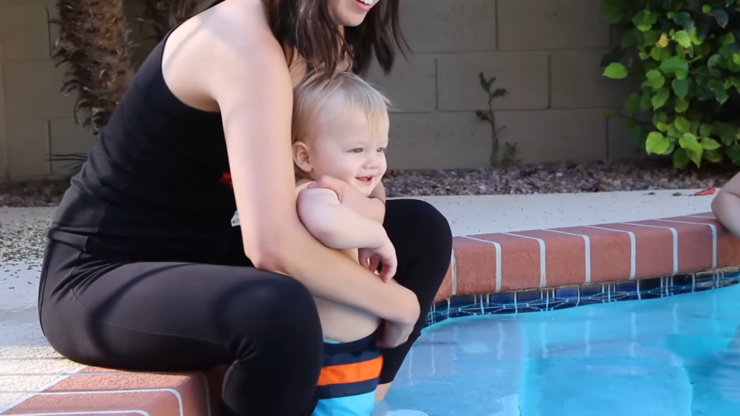
Exposing infants to swimming at an early age helps them adapt to aquatic environments more easily. Infants have a natural affinity for water, and swimming lessons capitalize on this innate comfort. This early adaptation can prove invaluable in emergencies, as infants who are familiar with water are more likely to instinctively react appropriately, potentially reducing the risk of accidental drowning.
6. Improved Sleep Patterns
The physical activity and stimulation provided by infant swimming lessons often result in improved sleep patterns. The combination of water play and exercise helps infants expend energy, promoting better sleep quality and duration. Parents often report that their infants sleep more soundly after engaging in swimming activities.
7. Boosting Confidence
Building confidence in and around water is a lifelong benefit of early swimming lessons. Infants who are comfortable in the water tend to develop a positive attitude towards new experiences and challenges.
As they master basic swimming skills, their self-esteem grows, setting a foundation for a lifetime of confidence in various aspects of their lives. This early boost in confidence can have a lasting impact on a child’s social, academic, and personal development.
Conclusion
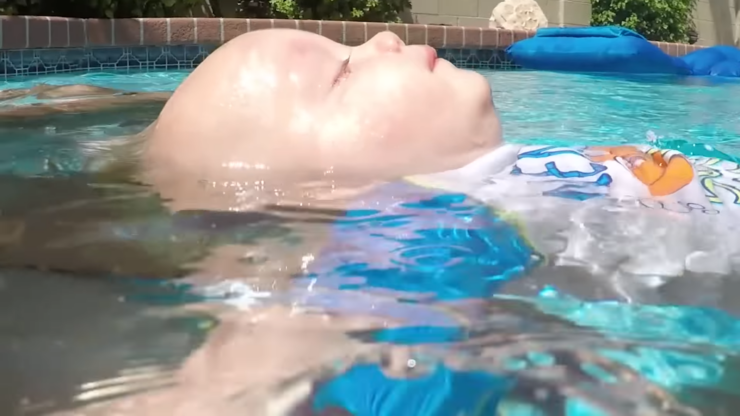
In conclusion, the benefits of infant swimming lessons extend beyond the joyous splashes in the pool. From enhancing water safety and physical development to fostering cognitive growth and socialization, early exposure to swimming provides a myriad of advantages for infants.
As caregivers, parents can play a pivotal role in their child’s holistic development by introducing them to the wonders of swimming at an early age. Embracing the journey of aquatic exploration, parents set the stage for a lifetime of confidence, health, and a love for the water.
From promoting physical and cognitive development to instilling crucial water safety skills and fostering parent-child bonding, these lessons play a vital role in shaping a child’s early years. As parents increasingly recognize the value of introducing their infants to swimming, we can anticipate a generation of children who are not only confident swimmers but also possess a strong foundation for a healthy and active lifestyle.
Infant swimming lessons provide a unique opportunity to introduce babies to water in a safe and controlled environment. Babies are naturally drawn to water, and by exposing them to swimming lessons early on, parents can help foster a positive relationship with water from the beginning. These lessons focus on gentle techniques that allow infants to become comfortable and confident in the water, laying the foundation for future swimming skills.

